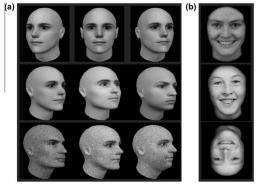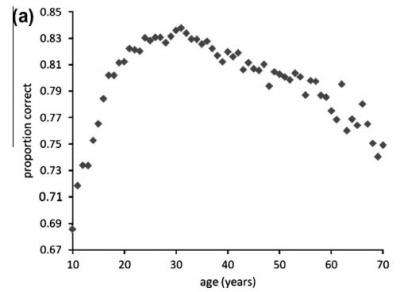December 15, 2010 report
Ability to recognize faces peaks in the 30s

(PhysOrg.com) -- A new online experiment has discovered that people between the ages of 30 and 34 are best able to remember faces. This finding contradicts the traditional belief that mental faculties all begin to decline from early adulthood.
The research aims to help scientists understand how the way our brains process information changes as we age, and how we process information about people in a social context. The researchers, led by Laura Germine of Harvard University in the US devised a 25-minute online experiment using an Internet version of the Cambridge Face Memory Test to find out.
The test presents the volunteer with six computer generated images of faces and then tests the subject’s ability to recall those faces when presented with a group of similar faces in different orientations and lighting conditions. All the faces are of young white males. Over 44,600 volunteers between the ages of 10 and 70 took part in the online experiments. Germine then replicated the tests with 10 white female faces and with faces of white girls and boys.
The results, to be presented in an upcoming issue of the journal Cognition showed that 30-34-year-olds of both genders performed best, when it was expected that people in their early 20s would be at the peak of performance because this is the age when the brain reaches full maturity. Germine said the preliminary results suggest the brain may need an “extended period of visual tuning” in early adulthood to enable people to recognize large numbers of faces, many of them similar.
The experiment did not collect information on the race or ethnicity of participants, which might have influenced their ability to recognize the white faces used in the test.

Other tests carried out by Germine’s research team included memorizing of upside-down faces of children, and recognition of men’s names. In these tests the best performers were in the 20-30 age group.
Germine, a graduate student in psychology, said the next step would be to track volunteers from childhood to adulthood to confirm the finding that face memory is at its best when people are in their early 30s.
Germine is webmaster and designer of the website Test My Brain, which is running a number of online experiments to determine how the brain works on a number of tests. Having the experiments run online allows the researchers to access a larger number of individuals from a wider cross-section of people than would otherwise be possible.
More information:
Germine, L. T., et al. Where cognitive development and aging meet: Face learning ability peaks after age
30. Cognition (2010), doi:10.1016/j.cognition.2010.11.00
The research paper is available here: www.people.fas.harvard.edu/~lg … es/cognition2010.pdf
© 2010 PhysOrg.com















